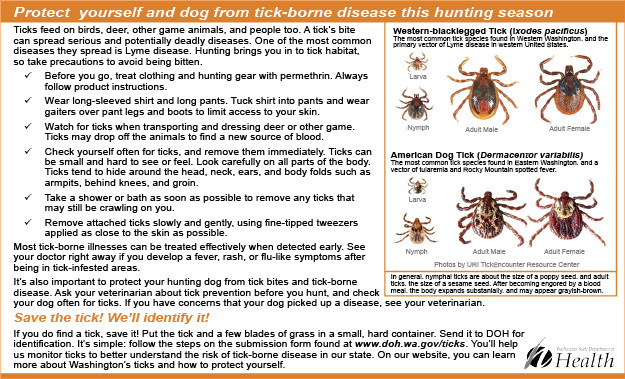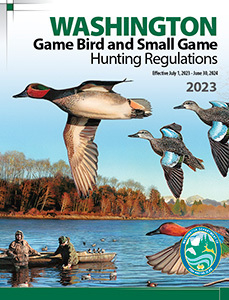Bird Dog Training Season
Aug. 1, 2023 - Mar. 31, 2024 — A small game license is required to train dogs on wild game birds. A western Washington pheasant license is required to train dogs on pheasants in western Washington.
Exceptions: Dog training may be conducted year-round on designated portions of:
Region One
- Espanola (T 24 N, R 40 E, E 1/2 of Sec. 16)
Region Two
- Martha Lake Access Area (170 acres): One mile northeast of the town of George, southeast of the South Frontage Road along Interstate 90 and north of Baseline Road.
Region Three
- Wenas Wildlife Area
Region Four
- Skagit Wildlife Area
- Lake Terrell Wildlife Area
- Snoqualmie Wildlife Area
Region Five
- Shillapoo/Vancouver Lake Wildlife Area
Region Six
- Scatter Creek Wildlife Area
- Fort Lewis Military Base
Training dogs on western Washington pheasant release sites is only open from 8:00 a.m. to 4:00 p.m.
Only youth and seniors may train dogs during their respective seasons on designated western Washington pheasant release sites. Wild upland game birds may be pursued during the dog training season but may not be killed except during established hunting seasons. Captive raised game birds may be released and killed during dog training if the hunter has proof of lawful acquisition (invoices) and the birds are appropriately marked (WAC 220-450-010 and 220-416-110).
Rabbit Hemorrhagic Disease – Guidance for Rabbit Hunters
Rabbit Hemorrhagic Disease Virus (RHDV1 and RHDV2) is a very contagious, often fatal disease in rabbits and is classified as a foreign animal disease. It is not known to infect humans or dogs, though they can spread the virus (as fomites). In 2020 an outbreak in native lagomorphs (rabbits and hares) occurred in southwestern North America, and in 2021 wild lagomorphs were infected with RHDV in Oregon and Idaho. RHDV is easily spread by direct contact with infected (live or dead) rabbits, and the virus can remain active for months in the environment. This virus has the potential to cause significant mortality in Washington’s native lagomorphs. WDFW continues to monitor reports of sick or dead rabbits and hares in Washington, and to date, have not detected this disease in wild populations. Please take extra precaution to reduce the risk of spreading this virus:
- Do not release nonnative domestic rabbits into the wild
- Do not move wild rabbits between areas, for any reason
- Attempt to prevent contact with dead rabbits (by dogs or humans); if contact is unavoidable, wash hands, clothes, shoes, (etc.), and/or the dog(s), with soap and warm water
- This should be done same day, or before moving to a new location
- If hunting rabbits, do not leave remains in the open; bury or discard appropriately to reduce the risk of scavengers. Double bag remains if discarding in the trash.
- Always wash hands thoroughly after handling rabbits or rabbit meat, domestic or wild.
- If you have pet rabbits, use extra precaution before going into the field. Carefully wash hands, shoes, and any other material(s) that may have been in contact with the domestic rabbits
For more information, see the Washington State Department of Agriculture website: https://agr.wa.gov/departments/animals-livestock-and-pets/animal-health/animal-diseases/rabbit-disease
There may not be any outward evidence of diseased rabbits, or the animals may exhibit bright red blood around the nose and mouth. If more than 3 dead rabbits are observed in close proximity, please contact a WDFW Wildlife Veterinarian ([email protected]).


